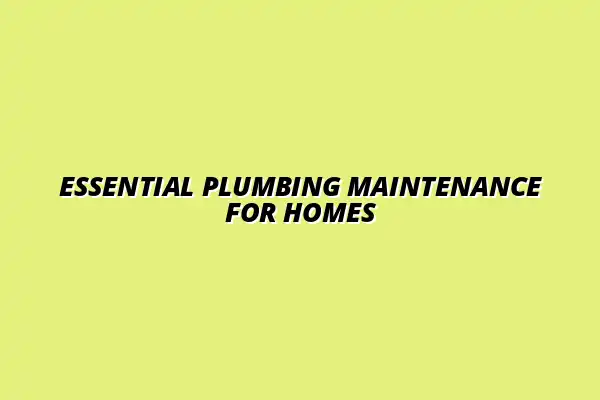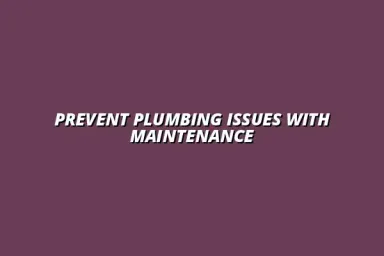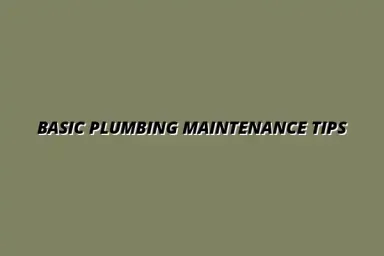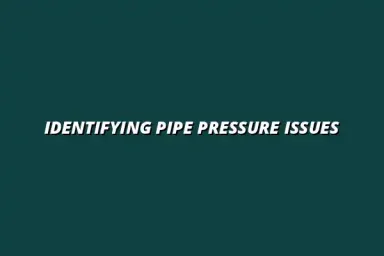The Vital Role of Routine Plumbing Maintenance in Home Care
Keeping a house in good shape requires more than just regular cleaning and organizing; it also involves taking care of essential systems like plumbing. Routine plumbing maintenance is crucial for ensuring that water flows where it should and that waste is disposed of properly. This practice not only prevents unexpected issues but also promotes a healthier living environment.
Investing time and effort in routine plumbing checks can save homeowners from facing major headaches down the line. It's about understanding what plumbing maintenance entails and incorporating it into your home care routine. For helpful tips on maintaining your kitchen plumbing, check out these plumbing maintenance tips for homeowners.
Understanding Routine Plumbing Maintenance
Definition and Scope of Plumbing Maintenance
Plumbing maintenance refers to the regular inspection, cleaning, and repair of a home's plumbing system. This includes pipes, fixtures, water heaters, and more. By keeping up with regular maintenance, we ensure that everything operates smoothly and reduces the risk of future problems.
Routine maintenance extends to various tasks that might seem minor but have a significant impact on the overall performance of the plumbing system. For example, flushing out water heaters and checking for leaks are essential components of maintaining plumbing health. Learn how to simplify water heater maintenance with these easy steps.
Key Components of a Routine Plumbing Checkup
- Inspections of pipes and fixtures for leaks or corrosion
- Flushing of water heaters to remove sediment buildup
- Checking for proper water pressure
- Ensuring drain systems are clear and functioning well
- Testing sump pumps and other water removal systems
By addressing these key areas, homeowners can maintain a well-functioning plumbing system and avoid the stress of urgent repairs. Regular checkups provide peace of mind, knowing that everything is in working order. Maintaining your plumbing can prevent costly repairs; learn more about preventative plumbing maintenance.
Benefits of Regular Plumbing Maintenance
Preventing Costly Repairs and Emergencies
One of the most significant advantages of routine plumbing maintenance is its ability to prevent costly repairs. Regular checkups identify small issues before they escalate into major problems. Emergencies like burst pipes or overflowing toilets can lead to extensive damage and expensive repairs, which can be avoided with proper maintenance. Understanding the causes of bursting water pipes is a crucial first step.
Addressing minor leaks or clogs early on is not just smart; it's financially savvy. The cost of routine checks is minimal compared to what you might pay for emergency repairs!
Enhancing Water Efficiency and Reducing Bills
Another benefit of routine plumbing maintenance is the enhancement of water efficiency. By ensuring that fixtures are functioning properly, you can significantly reduce water waste. This not only helps the environment but also lowers your utility bills.
Regular maintenance helps identify leaks, which can waste a surprising amount of water. By keeping your plumbing system in top shape, you're making a direct impact on your monthly expenses! Learn how to detect hidden pipe leaks at home to save water and money.
Extending the Lifespan of Plumbing Systems
Just like any other system in your home, plumbing systems have a lifespan. Regular maintenance can extend that lifespan, allowing you to get the most out of your investment. Proper care helps prevent wear and tear, ensuring that every component lasts longer. For advice on maintaining your bathroom plumbing, see our guide on tips for long-lasting bathroom plumbing.
It's always a good idea to treat your plumbing system with care. After all, a small investment in maintenance today can lead to significant savings in repairs and replacements in the future!
Common Plumbing Issues Prevented by Maintenance
Clogged Drains and Their Causes
Clogged drains are one of the most common plumbing issues faced by homeowners. Regular maintenance can help prevent clogs caused by debris, grease, and hair buildup. It's important to keep drains clear and flowing smoothly to avoid headaches down the road.
By using proper techniques during maintenance, such as snaking drains and using enzyme cleaners, you can keep clogs at bay and ensure your plumbing system works efficiently.
Leak Detection and Prevention
Leaks can go undetected for long periods, leading to water waste and potential damage. Routine plumbing maintenance involves checking for leaks in pipes, faucets, and toilets. Early detection is key in preventing costly repairs and damage to your walls or flooring.
Using special tools, plumbers can identify leaks that might not be obvious. This proactive approach saves homeowners money and helps maintain the integrity of the home.
Water Heater Malfunctions
Water heaters play a vital role in our daily lives, providing hot water for showers, washing dishes, and more. Regular maintenance helps prevent common issues like sediment buildup, which can lead to inefficiency and potential failures. Flushing your water heater regularly can keep it running smoothly.
By checking the thermostat settings and looking for signs of wear, homeowners can ensure that their water heaters provide consistent performance. Keeping a close eye on this appliance can save you from cold showers and emergency repairs!
How Often Should Plumbing Maintenance Be Conducted?
Seasonal Maintenance Checklist
To keep plumbing systems functioning at their best, it's wise to conduct maintenance at least twice a year. Seasonal checkups can help catch issues before they become serious problems. Each season brings its own set of challenges, so being proactive is essential.
- Spring: Check for leaks and clear outdoor drains from debris.
- Summer: Inspect hoses and irrigation systems.
- Fall: Prepare pipes for cold weather and check for drafts.
- Winter: Monitor for frozen pipes and ensure heating systems are working.
Using a seasonal checklist can streamline the maintenance process, making it easier to remember what needs attention throughout the year. This proactive approach can save time and money in the long run.
Factors Influencing Maintenance Frequency
While a general guideline suggests biannual checkups, some factors can influence how often maintenance should occur. Elements such as the age of your plumbing system, the type of piping materials used, and the climate in your area all play a role. Older systems may require more frequent inspections. For assistance with plumbing issues in Birmingham, consider contacting a local plumber like a plumber in Billesley, Birmingham.
Additionally, homes with heavy usage or those located in areas prone to extreme weather may need more attention. By being mindful of these factors, you can tailor your maintenance schedule to best fit your home’s needs!
Choosing the Right Plumbing Professional
What to Look for in a Plumbing Service Provider
Finding the right plumbing professional is crucial to ensuring your home’s plumbing system receives the best care. Look for licensed and insured plumbers who have a good reputation in your community. Checking online reviews and asking for references can help guide your choice.
Additionally, consider their experience with the specific plumbing issues you’re facing. A plumber who specializes in residential care will better understand your needs!
Questions to Ask Before Hiring a Plumber
- What services do you offer?
- Are you licensed and insured?
- Can you provide a written estimate?
- What is your availability for emergency services?
Asking the right questions can help ensure that you select a plumber who is well-equipped to handle your needs. A reliable professional will provide clear answers and build trust with their clients.
By taking the time to choose the right plumber, homeowners can feel confident that their plumbing maintenance will be handled with care and expertise. Investing in quality service pays off in the long run!
Addressing Common Questions About Plumbing Maintenance
How Can Homeowners Perform Basic Plumbing Maintenance?
It’s essential for homeowners to be proactive when it comes to plumbing maintenance. There are several simple DIY tips you can follow to keep your plumbing systems in good shape. Regular checks and minor fixes can go a long way in preventing bigger issues down the line!
One of the easiest ways to perform basic plumbing maintenance is by regularly inspecting your plumbing fixtures. Look for signs of wear and tear, such as rust or corrosion, and make sure to clean out aerators and showerheads to enhance water flow. Additionally, you can run water through your drains to ensure they are clear and functioning well.
- Flush your drains monthly with a mixture of baking soda and vinegar.
- Check and replace worn-out washers in faucets.
- Inspect your toilet for leaks using food coloring.
Tools Every Homeowner Should Have for Plumbing Tasks
Having the right tools can make minor plumbing tasks much easier! Here are some handy tools that every homeowner should consider keeping in their toolbox:
- Plunger – for clearing clogs.
- Pipe wrench – to grip and turn pipes.
- Adjustable wrench – for various fittings.
- Plumbing tape – to seal joints and prevent leaks.
These tools are not only useful for maintenance but can also come in handy during emergencies. Being prepared will save you time and potentially money in the long run!
What Are the Signs That Plumbing Maintenance Is Needed?
Understanding the warning signs of plumbing problems can save you from costly repairs. Certain indicators alert you that it’s time for a maintenance check. Keeping an eye out for these signs is crucial for every homeowner!
- Low water pressure in faucets or showers.
- Unpleasant odors coming from drains.
- Water spots or stains on ceilings and walls.
- Constantly running toilet.
Identifying these signs early can prevent bigger issues from arising. If you notice any of these problems, it’s best to act quickly!
When to Call in a Professional
While many plumbing tasks can be handled by homeowners, some situations call for a professional plumber. Knowing when to call in an expert can protect your home from significant damage. Here are some instances when it’s best to seek professional help:
- Persistent leaks that you cannot fix.
- Clogs that won’t budge, despite your best efforts.
- Low water pressure that doesn’t improve with adjustments.
- Complicated installations, like water heaters or sump pumps.
Overall, don’t hesitate to reach out for help when a plumbing issue feels beyond your capability. It’s better to be safe than sorry!
The Cost-Benefit Analysis of Plumbing Maintenance
Understanding the costs involved in routine plumbing maintenance can help homeowners make informed decisions. While some might see maintenance as an expense, it can lead to significant savings in the long run. I’ve found that the benefits far outweigh any initial costs!
- Regular maintenance can prevent emergency repairs.
- It can extend the lifespan of your plumbing systems.
- Routine checks can identify small problems before they escalate.
Investing in regular plumbing care helps maintain a smooth-running system and keeps unexpected costs at bay. It’s truly a smart financial decision!
Long-term Savings from Preventative Plumbing Care
Preventative plumbing maintenance not only enhances efficiency but also contributes to long-term savings. Homeowners who invest in routine checks often notice a decrease in utility bills and repair costs. It’s a win-win situation!
By addressing minor issues before they become major headaches, you can ensure your plumbing system runs efficiently. Investing in routine maintenance ultimately keeps your home safe, comfortable, and cost-effective!
The Connection Between Plumbing Maintenance and Property Value
Maintaining your plumbing systems can significantly impact your home’s resale value. Prospective buyers often look for well-maintained properties, and good plumbing can be a big selling point. If you want to ensure your home is attractive to potential buyers, regular maintenance is essential!
- Well-kept plumbing can lead to a smoother home inspection process.
- Homebuyers tend to favor properties with updated fixtures.
- Proper maintenance helps avoid red flags during showings.
Taking good care of your plumbing can elevate your home’s appeal. This simple step can make a crucial difference when you decide to sell!
Enhancing Home Safety Through Plumbing Upkeep
Proper plumbing maintenance isn’t just about saving money; it's also about ensuring safety within your home. Issues like leaks or faulty water heaters can lead to dangerous situations, including mold growth or water damage. By regularly inspecting your plumbing, you’re not just protecting your investment, but also your family's health!
Keeping your plumbing in check can prevent hazardous situations from arising. A safe home should always be a priority for every homeowner!
Final Thoughts on the Importance of Routine Plumbing Maintenance
Encouraging proactive home care is vital for maintaining a safe and efficient plumbing system. By staying ahead of potential issues, homeowners can save time, money, and stress in the long run. I always emphasize the need for routine plumbing maintenance!
Remember, the long-term benefits of plumbing upkeep far outweigh the costs. Investing in your plumbing not only protects your home but also enhances your overall quality of life. So, let’s take care of those pipes and keep our homes running smoothly!

 Kiran Almasi
Kiran Almasi

